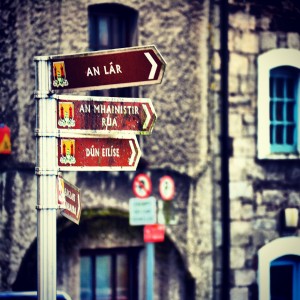
At the Heart of Culture
I am a firm believer in the link between language and culture. The daily vernacular can show as much, if not more, about a people’s beliefs, customs and perceptions as art or music.

Americans are lucky; we share our language with several other countries while retaining our unique dialect. That patented American accent is the quickest way to find a kindred soul while abroad. While Ireland is in a similar position, the country has been working for the last 100 years to revive its native language, Gaelic.
And now, time for a history lesson with the man we all love to hate: King Henry VIII.
In 1541, the Irish Parliament passed a statute that declared good ol’ Henry the King of Ireland. The Irish nobility had given their allegiance to the King in order to maintain their titles, power and land. But, alas, allegiances are mostly just words, and as the newly Protestant England worked to impose laws upon the predominately Catholic Ireland, the English overlords ran into some trouble. So England tightened its grip. Eventually, the native Irish lords were stripped of their power, and Irish culture, language and law laid by the wayside. More Scottish, English and Welsh settlers moved to Ireland as English culture, language and law was enforced.
The next 200+ years saw English rise as the accepted language. Using Gaelic was looked down upon and even punishable at times. The late 1800’s, however, saw a push for the use of Gaelic as a cornerstone of Irish culture. As Ireland gained more independence from Britain, the language found more of a foothold.

Today, Irish students are all required to take Gaelic in some form. And I, being the cultural thrill seeker I am, am taking an intro class in modern Irish.
It’s different. Incredibly different. My safety net of Latin root words is gone. The words, so easily formed on an Irish tongue, sound strangled and clipped when I try to say them. And yet, I’m happy to learn. Its through language that we find the heart of a culture. I don’t expect to use it in everyday life, if at all, but it helps me decode my surroundings.
It’s something that many have fought for the right to speak. So even if I butcher it, I’ll give it my best go.